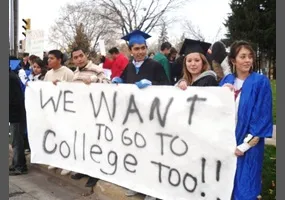- June 5, 2025
Texas’ undocumented college students no longer qualify for in-state tuition

By Eleanor Klibanoff and Jessica Priest, The Texas Tribune
“Texas’ undocumented college students no longer qualify for in-state tuition” was first published by The Texas Tribune, a nonprofit, nonpartisan media organization that informs Texans — and engages with them — about public policy, politics, government and statewide issues.
Sign up for The Brief, The Texas Tribune’s daily newsletter that keeps readers up to speed on the most essential Texas news.

Undocumented students in Texas are no longer eligible for in-state tuition after Texas agreed Wednesday with the federal government’s demand to stop the practice.
The abrupt end to Texas’ 24-year-old law came hours after the U.S. Department of Justice announced it was suing Texas over its policy of letting undocumented students qualify for lower tuition rates at public universities. Texas quickly asked the court to side with the feds and find that the law was unconstitutional and should be blocked, which U.S. District Judge Reed O’Connor did.
Texas Attorney General Ken Paxton claimed credit for the outcome, saying in a statement Wednesday evening that “ending this discriminatory and un-American provision is a major victory for Texas,” echoing the argument made by Trump administration officials.
“Under federal law, schools cannot provide benefits to illegal aliens that they do not provide to U.S. citizens,” U.S. Attorney General Pam Bondi said in a statement Wednesday. “The Justice Department will relentlessly fight to vindicate federal law and ensure that U.S. citizens are not treated like second-class citizens anywhere in the country.”
The Justice Department filed its lawsuit in the Wichita Falls division of the Northern District of Texas, where O’Connor hears all cases. O’Connor, appointed by President George W. Bush, has long been a favored judge for the Texas attorney general’s office and conservative litigants.
Texas began granting in-state tuition to undocumented students in 2001, becoming the first state to extend eligibility. A bill to end this practice advanced out of a Texas Senate committee for the first time in a decade this year but stalled before reaching the floor.
The measure, Senate Bill 1798, would have repealed the law, and also required students to cover the difference between in- and out-of-state tuition should their school determine they had been misclassified. It would have allowed universities to withhold their diploma if they don’t pay the difference within 30 days of being notified and if the diploma had not already been granted.
Republican Sen. Mayes Middleton of Galveston authored the legislation, which would have prohibited universities from using any money to provide undocumented students with scholarships, grants or financial aid. It would have also required universities to report students whom they believe had misrepresented their immigration status to the attorney general’s office and tied their funding to compliance with the law.
Responding to the filing Wednesday, Middleton wrote on social media that he welcomed the lawsuit and hoped the state would settle it with an agreement scrapping eligibility for undocumented migrants.
Middleton is running for attorney general in next year’s GOP primary, as incumbent Ken Paxton vacates the seat to run for the U.S. Senate.
The House contemplated similar legislation to Middleton’s bill. Under House Bill 232 by state Rep. Cody Vasut, R-Angleton, undocumented students 18 or older would have been required to provide proof that they had applied to become a permanent U.S. resident to be eligible for in-state tuition. That measure also died in committee.
To qualify for in-state tuition under the law that was struck down Wednesday, undocumented students must have lived in the state for three years before graduating from high school and for a year before enrolling in college. They must also sign an affidavit stating they will apply for legal resident status as soon as they can.
Texas Higher Education Commissioner Wynn Rosser told lawmakers on the Senate Finance Committee earlier this year that about 19,000 undocumented students have signed that affidavit.
Sen. Charles Schwertner, R-Georgetown, pressed Rosser to provide more information about students who had signed affidavits, including how many receive financial aid from the state. Rosser said he was unsure.
“We have a constitutional duty regarding K-12, but higher education does not have that duty regarding funding of non-citizens,” Schwertner said. “From a policy perspective, if we’re for big, strong, secure borders and walls, then we should also be looking on the back end of what we incentivize, or not incentivize, individuals that are coming across our borders illegally against federal law and state law.”
Before Wednesday’s ruling, Texas was one of 24 states, including the District of Columbia, to offer in-state tuition to undocumented students, according to the Higher Ed Immigration Portal.
This issue has come before the courts before. In 2022, a district court ruled that federal law prevented the University of North Texas from offering undocumented immigrants an educational benefit that was not available to all U.S. citizens. The 5th U.S. Circuit Court of Appeals threw out that case on procedural grounds, but noted there likely were “valid preemption challenges to Texas’ scheme.” Trump administration lawyers repeatedly cited that finding throughout Wednesday’s filing.
“States like Texas have been in clear violation of federal law on this issue,” said Robert Henneke, executive director and general counsel at the Texas Public Policy Foundation, the conservative think tank that brought the 2022 lawsuit. “If anything, it’s surprising that this wasn’t brought earlier.
Don Graham, a co-founder of TheDream.US, the largest scholarship program for undocumented students, said these young people already face significant hurdles to get to college. They cannot access federal grants and loans, so legal action to rescind in-state tuition could prevent them from completing or enrolling in college altogether, he noted.
“It’ll mean that some of the brightest young students in the country, some of the most motivated, will be denied an opportunity for higher education,” Graham said. “And it’ll hurt the workforce, it’ll hurt the economy.”
Hundreds of Texas students who have been awarded a Dream.US scholarship went into nursing and education, professions that are struggling with shortages. Recent economic analysis from the American Immigration Council suggests rescinding in-state tuition for undocumented students in the state could cost Texas more than $460 million a year from lost wages and spending power.
The loss of thousands of students will also have an immediate financial impact on universities, according to available data. About 20,000 students using the law to enroll at Texas universities paid over $81 million in tuition and fees in 2021, according to a report from progressive nonprofit Every Texan. In the wake of the court’s ruling, advocates said stifling those enrollments would create cascading effects.
“This policy has been instrumental in providing access to higher education for all Texas students, regardless of immigration status, and dismantling it would not only harm these students but also undermine the economic and social fabric of our state,” said Judith Cruz, assistant director for the Houston region for EdTrust in Texas.
At least one organization, Immigrant Families and Students in the Fight, which goes by its Spanish acronym FIEL, released a statement saying it would challenge the court’s judgment. “Without in-state tuition, many students who have grown up in Texas, simply will not be able to afford three or four times the tuition other Texas students pay,” FIEL Executive Director Cesar Espinosa said. “This is not just.”
Espinosa was one of dozens of witnesses who spoke against any repeal of the tuition law during a House committee hearing on HB 232 in April. The hearing stretched into the early morning hours as former students relayed how the law changed their lives for the better and gave them opportunities to become successful. In Espinosa’s case, it allowed him and his three siblings — including one who testified alongside him — to go to college in state and maintain successful careers in Texas.
“I’m here 24 years later to tell you that this works, and this is not a giveaway, but rather, this is something that all Texans deserve,” Espinosa said during the April hearing.
Disclosure: Every Texan, Texas Public Policy Foundation and University of North Texas have been financial supporters of The Texas Tribune, a nonprofit, nonpartisan news organization that is funded in part by donations from members, foundations and corporate sponsors. Financial supporters play no role in the Tribune’s journalism. Find a complete list of them here.
This article originally appeared in The Texas Tribune at https://www.texastribune.org/2025/06/04/texas-justice-department-lawsuit-undocumented-in-state-tuition/.
The Texas Tribune is a member-supported, nonpartisan newsroom informing and engaging Texans on state politics and policy. Learn more at texastribune.org.

